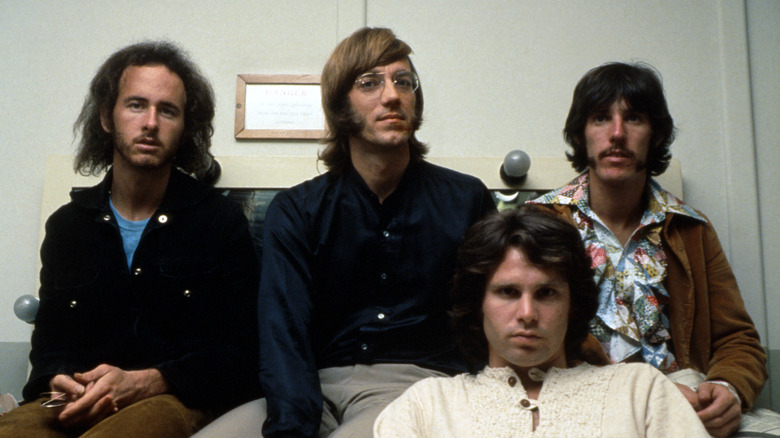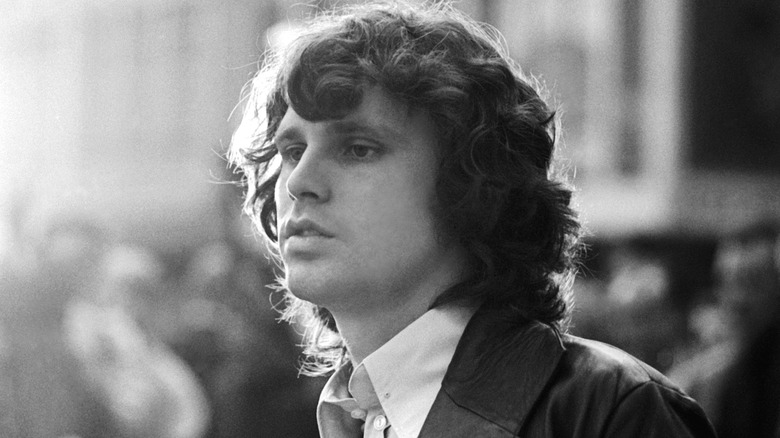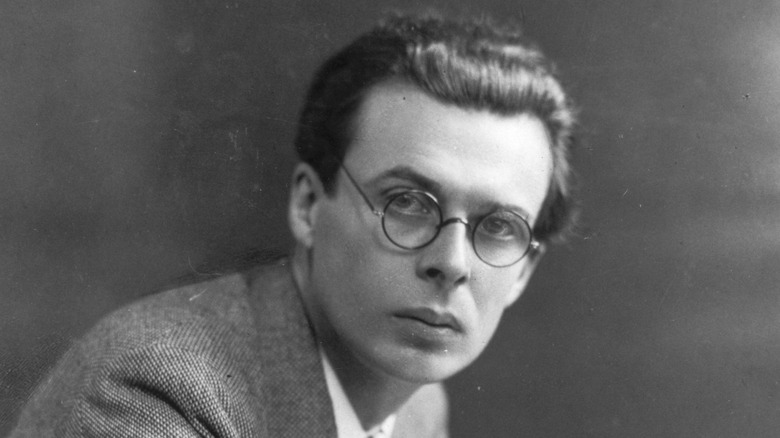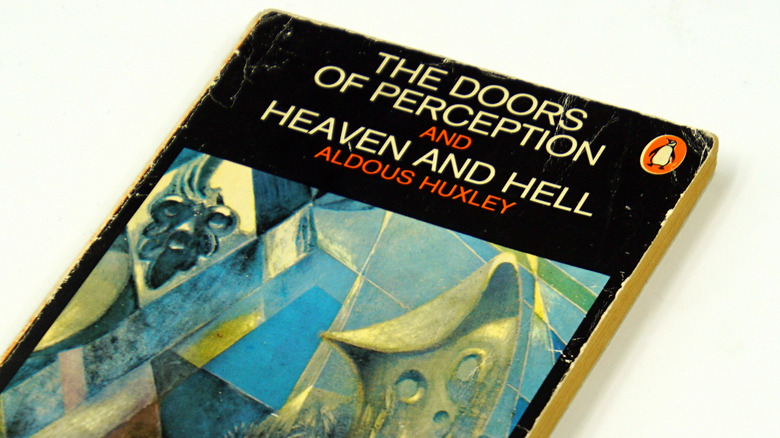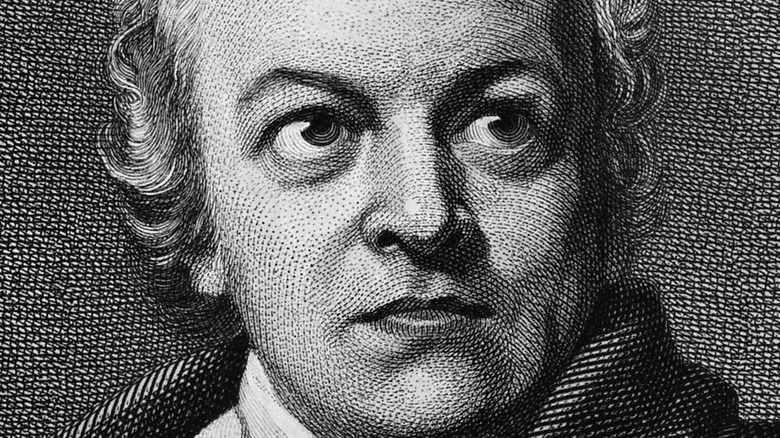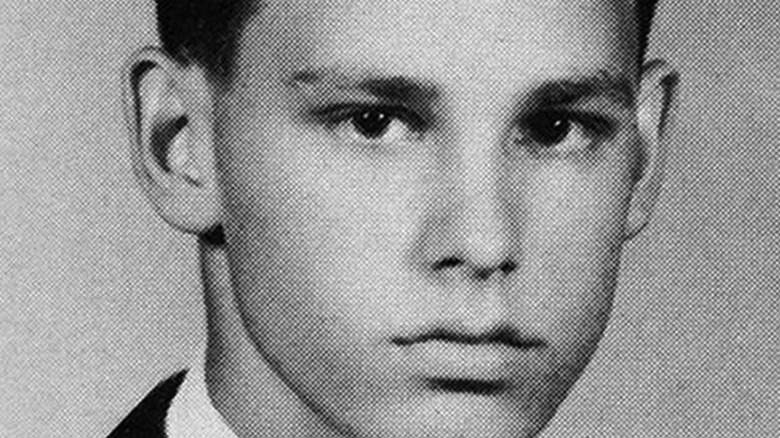Here's The Book That Influenced How The Doors Named Their Band
The Doors stepped on the music scene in the late 1960s with a unique approach to rock 'n' roll. Consisting of Ray Manzarek on the keyboard, Robby Krieger on guitar, John Densmore on drums, and of course, the now-legendary Jim Morrison as the lead vocalist, much of The Doors' success can be attributed to the band's poetic lyrics and Morrison's enigmatic presence.
All Music reports that Manzarek and Morrison met while they were both film students at UCLA. A chance encounter in Venice Beach, California led them to form The Doors. The band quickly signed to Elektra Records, (via Biography). From 1967 until 1971, The Doors released multiple albums and hit the road.
Per Britannica, Morrison's outlandish behavior both on and off stage contributed to the lore that continues to follow The Doors to this day. Attending one of their concerts was described as theatrical and melodramatic; one never knew what Morrison might do. History writes that in 1969, he faced legal repercussions when he allegedly exposed himself at a Miami concert. With Morrison's life and antics spiraling out of control, he fled to Paris to retreat.
On July 3, 1971, 27-year-old Jim Morrison died in his Paris apartment reportedly due to heart failure, but he and The Doors' legacy would live on. Now remembered for their hit songs such as "Light my Fire," "People Are Strange," and "Hello, I Love You," what some may not realize is that thanks to Morrison and his love for literature, the band rebranded from their original moniker into The Doors.
Jim Morrison came up with the band's name change
According to All Music, The Doors were previously called Rick & The Ravens. Manzarek and his brothers Rick and Jim created the band and had been playing together since 1961. The Vintage News explains that Rick & The Ravens were in need of a vocalist when Manzarek and Morrison ran into each other in 1965 at Venice Beach. Morrison told Manzarek that he had been writing lyrics, which prompted the keyboardist to invite Morrison to join the band. Despite never wanting to be a singer, Morrison agreed (per The Doors). Shortly after, Densmore, who was acquainted with Manzarek, joined the band.
Densmore then brought in Krieger, as they had both previously played for a band called the Psychedelic Rangers. Together, Rick & The Ravens recorded several notable songs that were later made famous by The Doors including "Moonlight Drive," "End of The Night," "My Eyes Have Seen you," and more (per The Vintage News). However, Rick and Jim were not a fan of these poetic-like recordings and subsequently left Rick & The Ravens.
Per another article from All Music, this prompted Manzarek, Morrison, Densmore, and Krieger to rename the band. At Morrison's proposal, Rick & The Ravens became The Doors (via Britannica). Morrison's inspiration for the name came from "The Doors of Perception," a book written by Aldous Huxley.
Who was Aldous Huxley?
Born in 1894, Aldous Huxley is best known for writing the dystopian novel "A Brave New World" (via Britannica). According to Biography, the English native originated from a family of renowned scientists, and Huxley himself envisioned a career in the field. However, in 1911, he began to go blind and he struggled with his vision for the rest of his life. Rather than pursuing science, Huxley found a new endeavor. He later told the Paris Review "I started writing when I was 17, during a period when I was almost totally blind and could hardly do anything else. I typed out a novel by the touch system; I couldn't even read it" (per Mental Floss).
Although he struggled to see well enough to read, he graduated from the University of Oxford in 1916. Cliff Notes writes that after leaving school, Huxley took on a teaching job and wrote for a number of publications including Vogue and Vanity Fair. In 1921, he published his first novel "Crome Yellow." Huxley quickly gained notoriety as an author for his satirical themes. In 1932, he released "A Brave New World."
Now considered to be one of the best novels ever written, Huxley's satire is evident but serves as a warning to future generations. Per LitCharts, themes include the dark side of technology and absolute government control. Nonetheless, it cemented Huxley's mark on the literary world. In 1954, Mental Floss writes that he released "The Doors of Perception" about his experiences with Mescaline.
Aldous Huxley and The Doors of Perception
Per Mental Floss, Huxley was a big fan of mescaline, a hallucinogenic drug. So much so, that he wrote "The Doors of Perception," which Biography describes as a series of essays, to enlighten others with his encounters. Huxley reportedly first became interested in mescaline due to his fascination with mysticism. The Guardian also suggests that his consumption of hallucinogens was partly due to his poor vision. Hero Magazine backed this statement up; with mescaline Huxley was able to see more vividly than he could in years. Although he has a pessimistic view on drugs in his famed novel "A Brave New World," it seems that mescaline changed his approach.
Huxley first experimented with the drug in May, 1953. Ultimately, this led him to become a proponent of mescaline as he believed that it was the way to true enlightenment. Hero Magazine points out that he also mentions spirituality and philosophy in "The Doors of Perception," In other words, mescaline allowed him to delve deeper into his consciousness.
A little over a decade later, The Vintage News writes that Morrison, who had read "The Doors of Perception," was inspired by the work and thus, suggested it as the name for his new band. Huxley, however, had conjured this title from a quote given by writer William Blake in his book, "The Marriage of Heaven and Hell."
Both Aldous Huxley and Jim Morrison were inspired by William Blake
Written sometime in 1790, The British Library writes that "The Marriage of Heaven and Hell," was Blake's response to Emanuel Swedenborg's own work, "Heaven and Hell." Swedenborg was a mystic and it seems that Blake was critical of his doctrine. The Guardian explains that Blake abhorred organized religion as he believed that it restricted personal freedoms, amongst other things. According to The College of New Jersey, Huxley was a devotee of Blake's work and it motivated him to try mescaline. In his eyes, the drug could offer more insight on Blake's work.
This coincides with Hero Magazine's explanation that Huxley turned to hallucinogens to deeply connect with his spirituality and his consciousness. Per The Vintage News, the title "The Doors of Perception" actually stems from a quote in "The Marriage of Heaven and Hell" that states "if the doors of perception were cleansed then everything would appear to man as it is, Infinite. For man has closed himself up, till he sees all things through narrow chinks of his cavern."
As for Morrison, Biography writes that he was introduced to Blake's work while he was a student at UCLA. Furthermore, Blake's influence can be readily seen in Morrison's own lyrics (via Zoamorphosis). In the song "End of the Night," Morrison croons "Some are Born to sweet delight, Some are Born to sweet delight, Some are Born to Endless Night." This was directly taken from Blake's poem "Auguries of Innocence."
Jim Morrison's other literary influences
At his core, Morrison was a poet and writer (via The Doors). His poetry had left Manzarek in awe and was instrumental in Morrison joining his band. According to GQ, Morrison always intended to be known more for his literary work rather than his music. Britannica writes that he was frustrated he was portrayed as a brazen rockstar and not as a master poet in the media. It's believed that this caused him to delve deeper into his writing and alcoholism (per Biography). Morrison's appreciation for literature began when he was a child. When he graduated high school, he even asked his parents for a collection of German philosopher Friedrich Nietzsche's work.
One high school friend noted, per Radical Reads, that "The whole point is that he (Morrison) was so far advanced in terms of literature he took in and he really seemed to become what he read sometimes." Far Out Magazine reports that besides the work written by Huxley and Blake, some of his favorite books included "Giovanni's Room" by James Baldwin, "Naked Lunch" by William S. Burroughs, "The Stranger" by Albert Camus, and many more. In 1978, a few years after Jim Morrison's tragic death, The Doors reunited in the studio to record music for "An American Prayer," a collection of the frontman's spoken words poetry.
